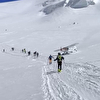Montserrat, Eneko and Iker Pou climb Tarragó, the route that no longer exists
The Basque brothers' recent involvement with Montserrat, one of Spain's oldest and most important climbing areas about an hour west of Barcelona dates back to last September when Iker started to attempt La Tarragó, a 240m aid line established ground-up in 2002 by David Tarragó with the help of Raúl Ballesteros, Dani Fernández, Xavier García and Toni Castelló. The route shares the first two pitches of another climb, then winds its way up the overhanging Diables face and had lain dormant ever since the first ascent.
"The project was an extremely interesting as for more than a decade no one had risen to the challenge of freeing this route, with sport climbing characteristics, opened from below with bolts fairly closely spaced but with a significant psychological handicap due to the crumbly rock" explained Iker, commenting "If you add to this the excitement we felt in climbing a hard route in Montserrat, the cradle of Catalan climbing, and a place where many of the country’s best alpinists, the project was perfect for us to give our all on. Tarragó was a line to put Montserrat on the international climbing stage in the 21st century."
After some work - cleaning the conglomerate, trying the moves but adding no further bolts - the Pou brothers pulled off the first ascent on the 5th of November grading the 6-pitch line 8b+. Understandably happy, they decided to return to complete their film of the ascent. Twenty days later they were back but on pitch 3 they stumbled across the unpleasant surprise: the original bolts used had been removed. A day later they abseiled from the top and this confirmed their worst fears: all the bolts had been removed by unknown climbers and the route was now unclimbable.
The splendid congolomerate Montserrat towers have always been an important breeding ground for some of Spain's top climbers and it is clear therefore that in an area steeped in history and tradition, complicated ethics which may cause bewilderment to the non-initiated. Regarding the actual first ascent, Iker explained "Tarrago opened the route in "easy aid climbing" but with the mentality that in the future someone could climb free it."
The Pou expressed their surprise to Planetmountain "There may be some controversy because on 4 pitch La Tarragó crosses an older A4 aid route. The first ascentionist climbed two variations there, one which destroyed the A4 pitch with aid bolts. But we didn't use this variation, we used the second one to the left which does not disturb the original aid pitch in any way, it only shares the same belay. The truth is we do not understand any of this, especially since so much time has passed since the first ascent."
According to the Pou the first ascentionist David Tarragó plans to rebolt his line this spring. "This entire situation is a big pity" Iker explained "since for the moment a beautiful route has been lost and, above all, the worst thing is that if a "bolt war" begins, all that will remain on the wall is lot's of "trash" metal . The only loosers in this unbelievable situation are, for sure, the Montserrat mountains."
| Expo.Planetmountain | |
| Expo La Sportiva | |
| Expo Petzl | |
| Expo The North Face | |
| www | |
| pouanaiak.com | |



 1 / 7
1 / 7
 Copia link
Copia link

 Filmut
Filmut





 See all photos
See all photos






















